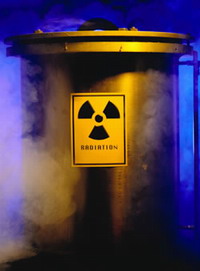Nations urged to prevent radioactive material from falling into hands of terrorists
Better inventories of radioactive material being used for industrial and academic purposes can prevent it from falling into the hands of terrorists.

The improved scrutiny was needed because of the possibility of a so-called "dirty bomb," said Steven Aoki, a counterterrorism official at the U.S. Energy Department.
"This is a major problem with a potentially large amount of radioactive material out there and unaccounted for," Aoki told an international conference on illicit nuclear trafficking. "We need to get hold of it and store it securely."
About 300 officials from more than 70 countries are meeting at the conference this week to assess trafficking in nuclear and other radioactive material and to propose a new policy regarding containment.
The International Atomic Energy Agency reported in August that there were more than 250 reported thefts or losses of nuclear material around the world in 2006, an increase of about 200 percent from 2002.
Most of the increase was due to better reporting and understanding by member states, but the IAEA also said that of the 150 incidents of "unauthorized possession" in 2006, 14 involved criminal activities, including illegal possession, movement or attempts to illegally trade these materials.
The conference also touched on fears that nuclear material could be supplied to terrorists from Iran, which is under Western pressure to halt its uranium enrichment program.
"The U.S. government designated Iran as a supporter of terrorism. At this point it would be purely speculation, but there is the scenario where Iran's nuclear materials could fall into the hands of terrorist organizations," Aoki said.
William Nye, Britain's Home Office director of counterterrorism and intelligence, told the conference that al-Qaida is actively seeking high-grade uranium and plutonium in order to detonate a "dirty bomb" in major cities such as London or Washington.
A dirty bomb would use conventional explosives to scatter radioactive debris.
"As the terrorists look for the next spectacular attack, we know that al-Qaida in Iraq is calling on nuclear scientists to join in the jihad," Nye said. "Combating this threat requires international cooperation."
Peter Jenkins, Britain's chief representative to the Vienna, Austria-based IAEA, told the conference that while it is not known if terrorists have acquired nuclear materials, the threat is real.
"Nuclear terrorism has been recognized as a genuine threat since the 1970s, and we have evidence that al-Qaida has been trying to acquire material since the 1990s. But it is since 9/11 that the risk has become a widespread international concern," Jenkins said, referring to the Sept. 11 attacks.
Subscribe to Pravda.Ru Telegram channel, Facebook, RSS!


